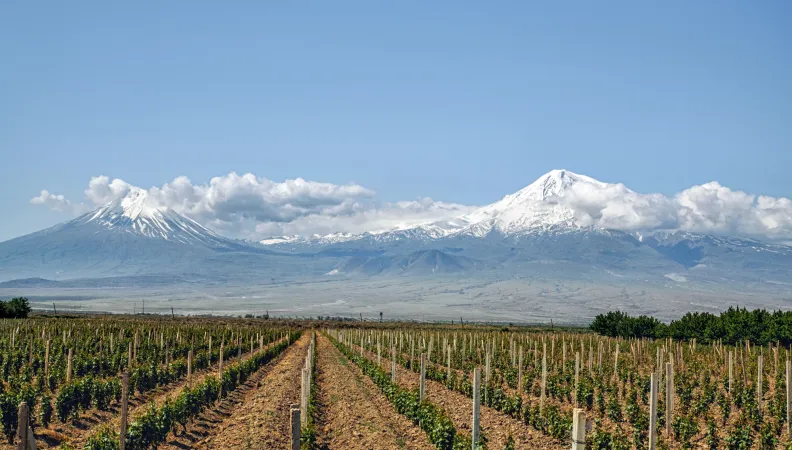Share the page
Farm Credit Armenia, a finance cooperative for food security
Published on
Armen Gabrielyan CEO and President Farm Credit Armenia


Private Sector & Development #39 - Food security: the contribution of the private sector
To mark World Food Day on 16th October 2023, the 39th issue was devoted to food security. It provides a collective reflection on the subject and highlights the need to get the private sector more involved in safeguarding food security across the globe.
FCA is Armenia’s sole agricultural credit cooperative. It supports – with the aid of an AFD Group 1.5 m euro loan – its clients, the members, owners, participants, and beneficiaries of the cooperative. Its commitment is to improve the quality of life in rural Armenia, by providing accessible financial services to targeted groups, thereby fostering the country’s sustainable development and contributing towards food security.
WHAT IS THE FOOD SECURITY SITUATION IN ARMENIA?
Food security is a core aspect of national security. In Armenia, it is ensured primarily by agricultural development, domestic food production, and food import systems.
Armenia has developed agricultural sectors, which ensure a comparatively high level of self-sufficiency. These include vegetables and fruit; sheep and goat breeding; egg and fish, beef and pork; and milk and dairy production. In other categories, though, the country relies heavily on imports; for instance, wheat, rice, sugar, and vegetable oil production. This dependency on imports exposes Armenia to risks, such as global food shortages and price increases. To address these issues, the government has implemented policies to promote domestic production in the vulnerable sectors and to reduce dependency on imports. These measures include subsidized loans and training for farmers, and promoting modern technologies and irrigation systems.
In 2020, Armenia’s Global Food Security (GFS) Index was calculated at 59.4%1, constituting food availability – 64.9%; accessibility – 55.4%; quality and safety – 65.1%; and natural resources – 51.2%.
WHAT ARE THE REASONS FOR THIS STATUS?
Armenia has historically experienced food security issues due to its geography, limited arable lands, and dependency on imports. It relies on agriculture for domestic food production, but climate conditions, land degradation, and inadequate infrastructure have posed challenges.Furthermore, there is a lack of modern technology and equipment available for developing agriculture and food production. Farmers battle to keep up with the demands of a rapidly changing market, requiring high quality and efficient production methods.
Additionally, the Nagorno-Karabakh conflict has impacted food security. It has disrupted agricultural activities, displaced populations, and damaged infrastructure, affecting farming communities and their ability to produce food. The sector most affected has been wheat production. A significant part of Armenia’s demand for wheat is met by wheat fields in Artsakh, which were reduced because of the 2020 Artsakh war. Moreover, socio-economic factors – poverty, unemployment, and income inequality – contribute to food insecurity in Armenia. Vulnerable populations, such as low-income households, may struggle to consistently access nutritious food.
HOW DOES FCA CONTRIBUTE TO FOOD SECURITY?
FCA’s mission statement reflects its commitment to improving the quality of life in rural Armenia, by providing accessible financial services to targeted groups, including agriculture; agribusiness; SMEs, micro borrowers; young, beginning and small farmers (YBS); women, and minority rural residents. It aims to contribute to the sustainable development of the country, by delivering the best loan products to all rural areas.
Almost 82% of the loan portfolio is allocated to different sectors of agriculture. FCA finances primary agricultural production (crop cultivation and cattle breeding), as well as food production and processing. Due to its small size, the cooperative is unable to significantly alter the country’s level of food security; however, it comprises 6-7% of Armenia’s total agriculture loan portfolio.
EXPLAIN THE FCA’S ‘ONE CLIENT – ONE VOTE’ COOPERATIVE STRUCTURE?
FCA is the only true cooperative credit institution in Armenia. Its members are the owners, controllers, and beneficiaries of the organization. The cooperative model contributes to stability, because of its proximity to its clients. It provides credit to its clients and members in good and bad times. The core values of the organization are honesty, respect, commitment, customer orientation, teamwork, accuracy, efficiency, transparency, and professionalism. It forms long-term relationships with owner-clients, who have complex financial requirements. In this regard, FCA is a socially responsible lender, which works for the benefit of all the farmers and beneficiaries of the cooperative.
WHAT ARE THE EXPECTED IMPACTS OF THE AFD GROUP SUPPORT?
The loan from AFD (in Armenian dram) plays a crucial role for this credit cooperative. As FCA increases its equity from the members’ contribution, it is very difficult to achieve significant annual growth. The AFD subordinated loan is accounted for as Tier 2 equity, which increases lending capacity and allows leveraging of the total equity to borrow additional funds. This type of partnership illustrates the significant role of development institutions, and is a prime example of strategic partnership.
The agricultural credit market is highly competitive in Armenia. FCA’s strategy is to maintain and grow its market share by focusing on its strengths, including its flexibility, pricing, customer service, and cooperative principles. A variety of new products are in development. These include agro-tourism and rural tourism loans, value chain financing, and energy efficiency and green loans, as well as loans to young, beginning, and small farmers, in addition to a recently activated leasing product. FCA is a small financial institution; yet, it has a nation-wide structure.

